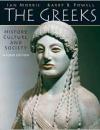Ian Morris
Ian Morris
Jean and Rebecca Willard Professor of Classics
Faculty, Stanford Archaeology Center
B.A., Birmingham University, 1981
Ph.D., Cambridge University, 1985
Ian Morris is a historian and archaeologist. He has dug in Britain, Greece, and Italy, most recently as director of Stanford's excavation at Monte Polizzo, a native Sicilian site from the age of Greek colonization. He began his career studying the rise of the Greek city-state, then moved on to ancient economics, and now works on global history since the Ice Age. He has published fourteen books. One of them, Why the West Rules--For Now (2010), has been translated into thirteen languages, and the most recent, Foragers, Farmers, and Fossil Fuels: How Human Values Evolve (2015), into six. In addition to digging and writing, he regularly speaks to academic, business, government, and strategy groups, and has been a visiting professor in the University of Zurich's executive MBA program. At Stanford he has served as chair of the Classics department, director of the Archaeology Center, and Senior Associate Dean of Humanities and Sciences. He has held several research awards, including Guggenheim and Andrew Carnegie fellowships, and has won a Dean's Award for excellence in teaching and several literary prizes. He is also a fellow of the British Academy, the Society of Antiquaries, and the Secular Policy Institute, and is a contributing editor at Stratfor, a stratgic forecasting company. He lives in the Santa Cruz Mountains with his wife, one dog, five cats, two horses, and a peacock.
Courses
Autumn 2015-2016
Global History: The Ancient World (HISTORY 1A)
Global History: The Ancient World (HISTORY 1A)
Winter 2015-2016
The Greeks (HISTORY 101)
The Greeks (HISTORY 101)











